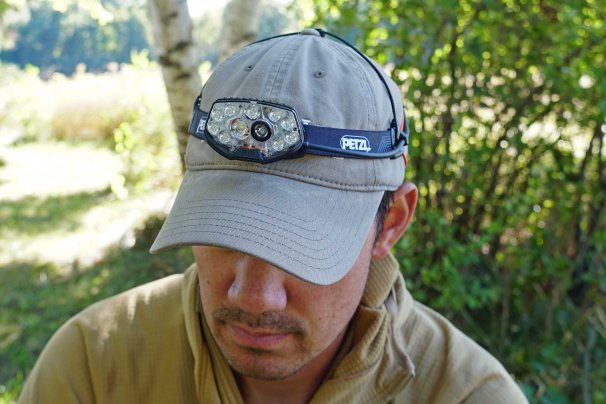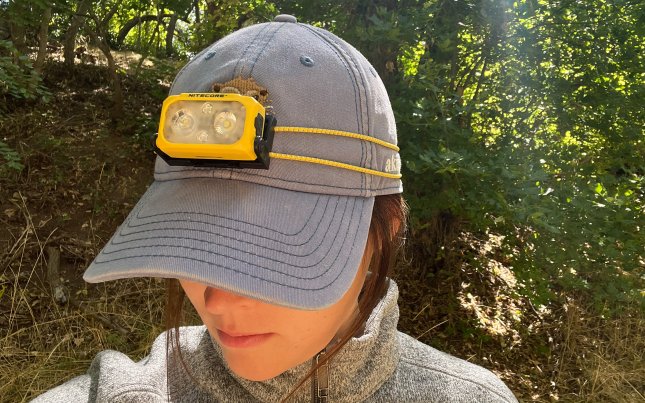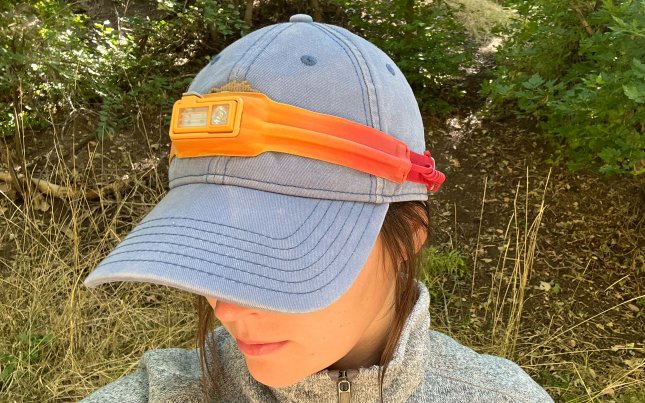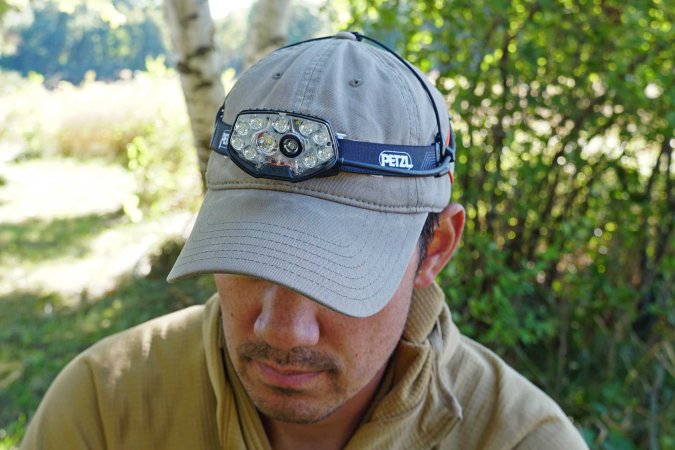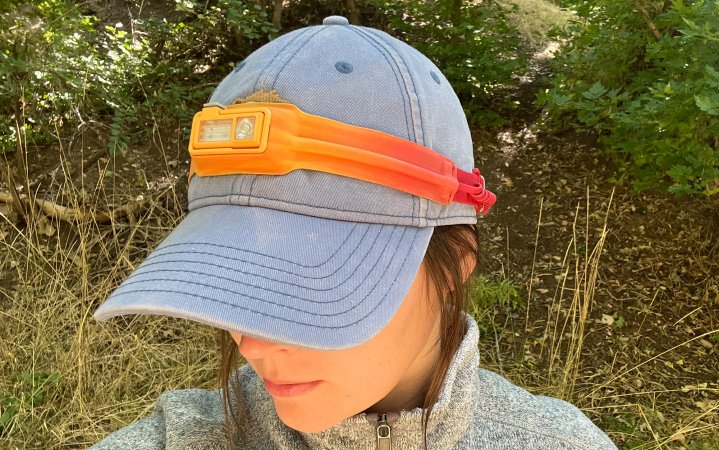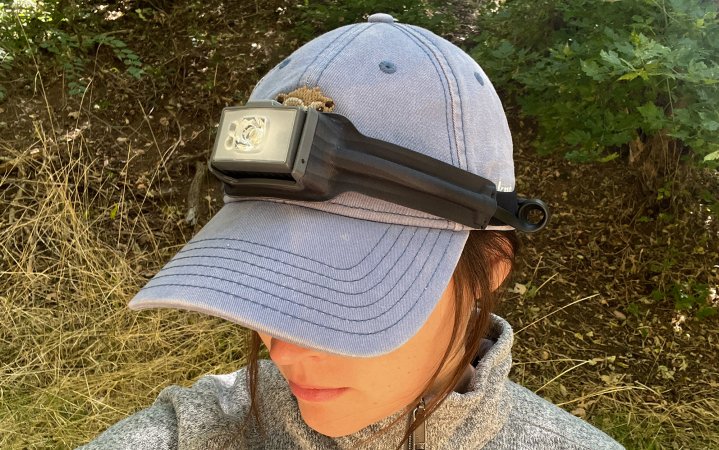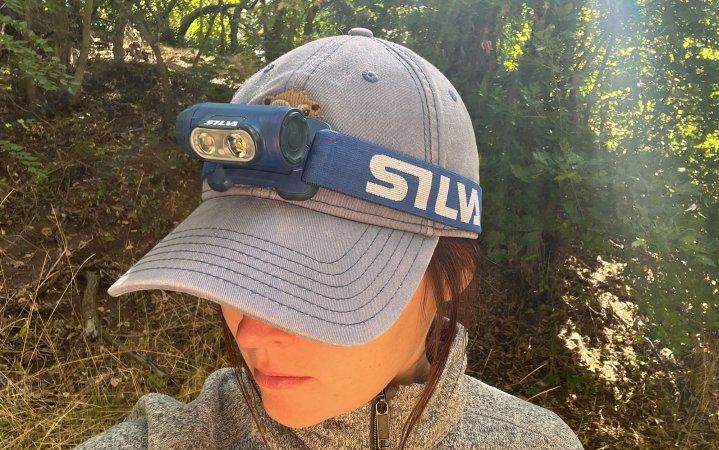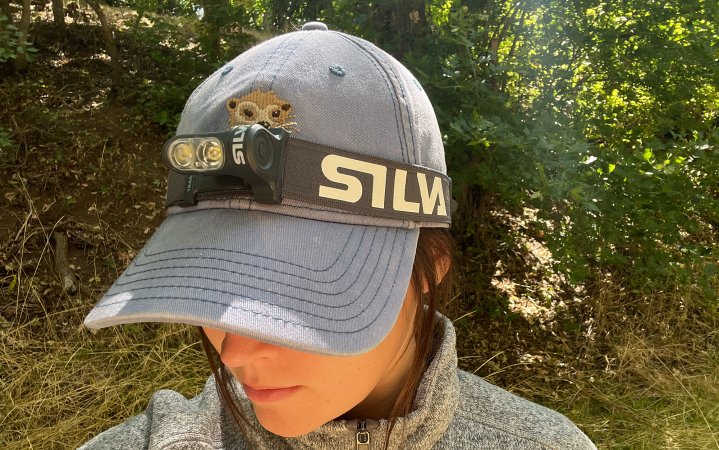We may earn revenue from the products available on this page and participate in affiliate programs. Learn More ›
There’s a few reasons you might find yourself running in the dark. Maybe you have to fit your workout into a busy schedule, or maybe you want the trail all to yourself. Either way, you’re going to need one of the best running headlamps. Outdoor Life trail runners tested and reviewed the best running headlamps that have a secure fit, steady lighting, and adequate throw for navigating rough terrain at high speeds.
- Best Overall: Petzl Nao RL
- Best Value: Nitecore Nu25 UL
- Best Low-Profile: BioLite Headlamp 425
- BioLite Headlamp 800 Pro
- Silva Explore 4
- Silva Trail Runner Free
How We Tested the Best Headlamps

To test the best running headlamps, we first used them in the field. OL editor-in-chief Alex Robinson and I have been wearing these headlamps for dark trail runs on wooded trails, rocky descents, snowy hills, and more.
By using these headlamps in the field and doing side by side comparisons with models of similar lumen levels, we judged which lights performed best in close quarters versus long distances at different brightness settings. Then, we performed controlled battery life, freeze, and water resistance tests.
Read Next: Best Headlamps, Tested and Reviewed
Battery Life
We turned all of these headlamps to the highest setting and recorded how long it took for them to die. This was to get a general idea of their battery usage, not necessarily to compare it to manufacturer provided specs. The advertised battery life was always shorter than the actual burn time. This is because manufacturers stop timing battery life when the light dims significantly — not when it actually dies. Keep in mind that headlamps with alkaline batteries will usually outperform rechargeable batteries.
Freeze
We put these headlamps in the freezer for an hour to make sure they’d all still turn on in freezing temps.
Water Resistance
Ingress Protection (IP) ratings dictate the dust and water resistance of a product. The first number is dust resistance from 0 to 6, and if the product is not rated to withstand dust there’s an X as a placeholder. The second number is water resistance ranging from 0 to 8.
While most of these headlamps can’t be submerged (IPX7), they should withstand splashes from all directions (IPX4). I left these headlamps outside in the sprinkling rain for half an hour. Then, I threw a cup of water on them for good measure.
Best Running Headlamps: Reviews & Recommendations
Best Overall: Petzl Nao RL
Pros
- Wide, bright beam
- Lots of fit adjustments
- Comes with a storage pouch that doubles as a lantern
Cons
- Heavy
- Expensive
Key Features
- Lumens: 1500
- Lights: Reactive and standard white
- Weight: 5.11 ounces
- Weather Resistance: IPX4
- Price: $180
- Warranty: 3 years
- Measured Battery Life: 2.5 hours on max brightness
- Rechargeable
- Rear red light
Not all headlamps are useful for trail running; in fact, most aren’t. This is because the super lightweight lamps are usually not bright enough and the heavier ones always seem to wobble and shift as you run. The bouncing beam will make you dizzy or you’ll have to constantly reposition the headlamp as you go.
So if you are going to be running at night regularly, I suggest spending the extra cash on a headlamp that was designed for the purpose. Meet Petzl Nao RL. You’ll see this headlamp being worn by the world’s top ultra-runners (like phenom Courtney Dauwalter), but you don’t have to be lining up at UTMB to appreciate its features. I wore the Nao RL for a few nighttime trail runs around my house (after years of experimenting with other inferior headlamps) and now I’ll never run at night without it.

There are a few specifics that make the Nao RL an ideal headlamp for running. The first is fit. You’ll notice that the battery pack is in the back, which makes the weight more balanced and helps prevent the headlamp from moving out of place while running. Instead of a single strap, the Nao utilizes a harness system (with multiple adjustment points) for your head. It takes some tinkering to get it to fit properly, but when you do get it right, it will feel comfortable and stable no matter what type of running you do. Plus the lamp itself does not wiggle on the strap at all when you run.
This headlamp also has a reactive lighting mode. The light body has a sensor and accelerometer which work to automatically adjust the brightness of the beam depending on the distance of the objects around you, the amount of available ambient light, and the speed at which you’re traveling (faster means more light, slower means less light). There is of course a standard mode, which allows you to adjust brightness manually. However, the benefit of the reactive mode is that it preserves battery life by dimming the light at times when you don’t need full power.
While messing around in camp, the reactive lighting mode was annoying to me. I just wanted a consistent beam. But while running, I didn’t even notice the feature, which is what you want. I settled on using the second brightness setting (out of three) in reactive mode for my runs, which seemed to be the perfect sweet spot of brightness and battery life (at least five hours). On max power, the battery only lasted 2.5 hours. So if you are a hardcore ultra-runner who will be trucking through an entire night, you should get a second rechargeable battery to keep in your vest.
Additional features that I appreciated about this headlamp are the optional red light on the back (so cars can see you if you’re road running), the white carrying pouch which doubles as a lantern if you leave the lamp on, and the ability to lock the light (so it doesn’t accidentally switch on) by holding the power button for four seconds. —Alex Robinson
Read Next: Best Running Vests
Best Value: Nitecore Nu25 UL
Pros
- Ultralight
- Simple to use
- Affordable
Cons
- None
Key Features
- Lumens: 400
- Modes: Spot, flood, and red
- Weight: 1.59 ounces
- Weather Resistance: IP66
- Price: $37
- Warranty: 2 years
- Measured Battery Life: 11 hours, 45 minutes
- Rechargeable
This is the best running headlamp for your money. It’s under $40 and bright enough to hike, run, or even bike a trail at night. One tester used this headlamp to pedal up and ride down a wooded single-track trail after work. He said the impressive throw allowed him to see far enough in front of him to go full speed. It’s easy to adjust to your head and relatively comfortable. The cords are similar to the ones on our best overall pick and provide a stable fit while running, though the Nu25 isn’t as immovable as the harness system of the Nao RL. The Nu25 UL is much lighter though, at less than 2 ounces.

Staff writer Laura Lancaster’s ideal headlamp would have a single button for on, off, and red. While there are two buttons on this lamp, it was still her favorite because of how simple it is to use, and because it’s light weight. One button toggles which of the two lights are on, and the other button cycles brightness levels and red. If you’re looking for something simple, affordable, and effective, this is a great multi-sport option. The Nitecore Nu25 UL also lasted almost 12 hours in my battery life test.
Best Low Profile: BioLite Headlamp 425
Pros
- Dimmable red
- Slim profile
- Stable when running
Cons
- Difficult to tilt
- Must cycle through all settings to turn off
Key Features
- Lumens: 425
- Modes: Spot, flood, dimming, strobe, and red
- Weight: 2.75 ounces
- Weather Resistance: IPX4
- Price: $60
- Warranty: 1 year
- Measured Battery Life: 6 hours
- Rechargeable
- Rear red light
This headlamp reminds me of a mullet with an all-business, no frills light in front, and the rest of the party — a rechargeable battery and rear light — in the back. While BioLite isn’t the only company balancing the weight of their headlamps by putting the battery on the back, the slim light source makes theirs ultra low-profile. Because the light seamlessly integrates into the band, the beam is steady when running. This model has great proximity lighting for trails, and it’s comfortable to wear. The battery lasted 6 hours in the burn time test.

I love that you can dim the red light to preserve your night vision. This headlamp is less packable than others, however, due to the separate battery and lamp units, along with the cord to connect them. If you’re wearing gloves, you might struggle to adjust the tilt of the light because it’s so skinny. It’s also a little annoying to have to cycle through all of the settings to turn it off, which means you’re subjected to the strobe feature every time. But the stability, low-profile, and various brightness levels makes the BioLite 425 ideal for night running.
BioLite Headlamp 800 Pro
Pros
- Large proximity lighting
- Stable when running
- Can connect to an external battery (3-foot cord included)
Cons
- Not the best distance lighting
Key Features
- Lumens: 800
- Modes: Spot, flood, dimming, strobe, and red
- Weight: 5.3 ounces
- Weather Resistance: IPX4
- Price: $100
- Warranty: 1 year
- Measured Battery Life: 20 hours and 50 minutes
- Rechargeable
- Rear red light
The 800 Pro is similar to the BioLite 425 in that it’s comfortable to wear because the battery is on the back, balancing the weight across your head. It illuminates your surroundings excellently, and the battery lasted an impressively long 21 hours. Tilting this model is easier than BioLite’s 425 headlamp thanks to a space between the band and light housing to hook your finger into.
There’s no movement while running. But while it lights up the space around you well, it doesn’t cut through darkness over distance. You have the option of using an included 3-foot cord to connect an external battery for long missions, or extreme cold weather where battery life can diminish. The ability to prolong the battery life with extra batteries means you always have extra juice to keep going at night.
Silva Explore 4
Pros
- Low mode is 10 lumens, great for reading
- Removable wide band
- Great battery life
Cons
- Turns on at highest setting
- Batteries are not included
- Gel inside headband tugs my hair
Key Features
- Lumens: 400
- Modes: Low, medium, high, orange, and red
- Weight: 3 ounces
- Weather Resistance: IPX7
- Price: $50
- Warranty: 2 years
- Measured Battery Life: 27 hours and 45 minutes
- Three AAA batteries or Silva Explore 4RC rechargeable version for $65
For high intensity activities like trail running, you need a headlamp that will stay in place and adjust to exactly where you need it. The Explore has a wide band with a thin gel line inside to keep it in place. You can twist the Explore completely up or down, with the ability to make minute adjustments. I love being able to angle the beam exactly where I want it, and have it stay there.
This headlamp was the second to last to die in my battery test. It took almost 28 hours to kill the three Duracell AAAs. Disposable batteries are almost always going to outlive rechargeable batteries, but this headlamp wouldn’t quit. You’ll just have to buy those batteries separately, or opt for the rechargeable version.
The gel on the band that keeps it in place does tug on my hair, but it keep the light stable when running. You could opt for a hat to help with this issue. It automatically turns on at the highest setting which can be annoying, but if you hold down the button you can access the pleasant red and orange modes.
Though, the Explore 4 doesn’t pack down very small, the long battery life, streamlined housing, and effective headband make the Explore 4 great for running, exercising, and other fast paced missions.
Silva Trail Runner Free
Pros
- Penetrating brightness
- Option to carry battery or mount to the back
- Hybrid battery
Cons
- Gel on band pulls my hair
- No red light
Key Features
- Lumens: 400
- Modes: Low, medium, high, and strobe
- Weight: 4 ounces
- Weather Resistance: IPX5
- Price: $90
- Warranty: 2 years
- Measured Battery Life: 5 hours
- Rechargeable or three AAAs
- Rear red light
This tiny light surprised me; it seems to be milking every one of those 400 lumens. The beam is bright and cuts through the darkness, making it ideal for lighting long distances. If you’re looking for steady brightness, the Trail Runner free is a great option for rough terrain or expansive ridges. You can streamline the band as well by carrying the hybrid battery pack in your pocket using the included cord. Or keep it mounted to the back of the extra thick band.
The lamp is stable when running, and the battery lasted 5 hours in the burn time test. This headlamp is versatile enough for most activities, though well suited for running. But the gel on the inside of the band did pull on my hair uncomfortably.
Things to Consider Before Buying the Best Running Headlamp
Brightness
Trail running involves hopping over obstacles, navigating your route, and possibly traversing hazardous terrain, and if you’re doing all of that in the dark at high speeds, you’re going to need a pretty bright headlamp. All of the best running headlamps on this list are 400 lumens or more. While higher lumen headlamps will provide more visibility, they can also come with clunkier batteries. The Petzl Nao RL and BioLite 800 Pro are our brightest picks, however, and they’ve managed to keep the weight down and successfully balance the battery on the back of the band.
Battery
You have some options when it comes to battery type: rechargeable, disposable, or a combo of the two. The hybrid style is my favorite so that I can keep my headlamp charged, but fall back on AAAs if I forget or it dies. The Silva Trail Runner Free has this capability. And some of the brands selling rechargeable headlamps also offer backup batteries.
Fit
Fit isn’t the most important consideration when you’re grilling burgers at camp with your headlamp around your neck, or just trying to find a nice tree to pee behind, but when you’re running, a bobbing light or sliding band can make you dizzy, and frustrated. All of the best running headlamps we chose keep the light steady in motion, but using different designs. The Petzl Nao RL has the most sophisticated — and effective — system, but you can also choose between the gel bands on Silva models, streamlined BioLite designs, and lightweight, corded Nitecore Nu25 UL.
FAQs
I think 400 lumens is a happy medium between bright enough to run at your top speed and lightweight enough for comfort and stability. Though there are brighter (more expensive) options on this list that still fit securely.
Four-time-UTMB-winner François D’Haene collaborated with Petzl to create the Nao RL, worn by the likes of Courtney Dauwalter and other top ultra-runners.
While lithium batteries are lighter, last longer, and perform better in cold weather, a headlamp that takes batteries may specify alkaline due to differences in voltage. Check that your specific headlamp accepts rechargeable lithium batteries before using them.
Final Thoughts on the Best Running Headlamps
Not all headlamps are great for running. High intensity activities mean fit and brightness are super important. That said, if you are looking for a do-it all headlamp, the Nitecore Nu25 UL is the best option, and at a great price. If you’re a serious runner committed to pre-dawn starts or late night jogs, the Petzl Nao RL is worth investing in. You can find a running headlamp that works for you and your budget on this list.
- Best Overall: Petzl Nao RL
- Best Value: Nitecore Nu25 UL
- Best Low Profile: BioLite Headlamp 425
- BioLite Headlamp 800 Pro
- Silva Explore 4
- Silva Trail Runner Free

